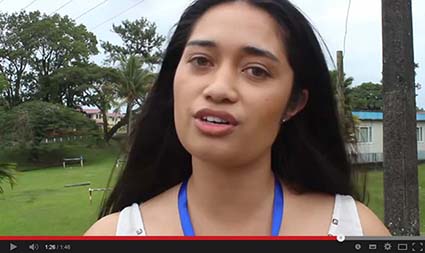
Joanna Mathers
AUCKLAND (New Zealand Herald/Pacific Media Watch): Coverage of the Fijian elections by three New Zealand postgraduate student journalists has been awarded a top prize at the annual Ossie Awards.
Mads Nyborg Anneberg, Alistar Kata and Tom Carnegie from Auckland University of Technology's (AUT) Pacific Media Centre won the prize for best use of convergent media at the awards in Sydney, which celebrate top student journalism in Australia and the South Pacific region.
Ossie judge and Australian journalist Tania Bawden said the students' coverage "provided wide-ranging insights into a range of issues and election dramas, in the first democratic elections in Fiji since the military coup of 2006".
Professor David Robie, director and founder of the Pacific Media Centre (PMC) and editor of independent news outlet Pacific Scoop, says their coverage was of extremely high quality: "In my opinion they provided the best New Zealand media coverage of the elections."
The trip, part of course requirements for the Asia-Pacific Journalism paper run through PMC, was a first for a New Zealand journalism school.
"No school has done anything like this before," Dr Robie says. "Mads and Alistar were blown away by the experience in Fiji - it was a real opportunity for growth."
Anneberg and Kata (based at Republika and Wansolwara newspapers respectively in course internships) flew to Suva a week before the election; Carnegie acted as coordinating editor and was based at the PMC in Auckland where he also filed many stories for coursed website Pacific Scoop.
Head start
Dr Robie says that being on the ground a week before the election gave them head start when it came to connection with local people: "People can be a bit wary of media who descend around election days and then disappear. By spending longer in Suva they were able to develop good relationships and gain greater insights into attitudes about the election."
Dr Robie says there was always potential for difficulty covering an election in such a volatile political environment.
"We never quite knew what would happen if things didn't go [coup leader and now elected Prime Minister Voreqe] Bainimarama's way," says Dr Robie. "Would there be another coup? What impact would that have on our students?"
Anneberg says that there was one situation that made him uneasy when he was reporting from Suva : "I was wandering around taking photos of the new Parliament Buildings and was taken in for a small interrogation, where I pretended to be a tourist because I felt uneasy about the situation. But it was understandable they were on edge because the building also housed the Prime Minister's office."
Carnegie says there were some difficulties getting the stories out of Fiji: "There was a three-day media blackout that ended at midnight on election day; the penalties for breaching were either a fine of $50,000 and/or 10 years imprisonment.
Media blackout
"It is common for a country to have a media blackout but three days is extensive, and the threat of imprisonment is unheard of.
"I believe the electoral commission stopped us from publishing one of Mads' stories. I also received a 'friendly reminder' email from the commission that the blackout applied to international media. That made no sense...plus I was outside their jurisdiction, so I continued to cover the election during the blackout. However Mads and Alistar had to stop."
Dr Robie says in spite of the increased transparency offered by the internet, such situations reveal how difficult reporting in the Asia-Pacific region can be.
"There are a lot of media freedom issues, journalists face dangers not present in New Zealand; the Asia-Pacific Journalism course helps prepare students for that. We also help students to make sense of the different legal systems around the region."
Dr Robie, a journalist in the Asia-Pacific region for more than two decades, has experienced the difficulties they can face. He has written 10 books on politics and media freedom in the region; the most recent being Don't Spoil My Beautiful Face: Media, Mayhem and Human Rights in the Pacific, published last year by Little Island Press.
* This story is part of a content partnership between the New Zealand Herald and AUT.
Alistar Kata reflects on the Fiji assignment
This work is licensed under a Creative Commons Attribution-NonCommercial 3.0 New Zealand Licence.




